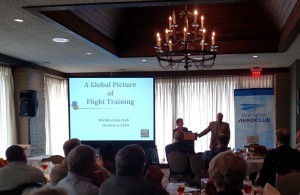Monthly Archives: October 2016
October 31, 2016
The 37th Annual Kansas Economic Outlook Conference took place on October 6, 2016.
About the CEDBR.
The mission of the Center for Economic Development and Business Research (CEDBR) is to enhance the region’s economic growth and development by:collecting, analyzing and disseminating business, economic and demographic information
conducting applied business, economic and demographic research
serving as a vital link between the business and economic development community, Wichita State University and the W. Frank Barton School of Business.
The CEDBR strives to be recognized by the business and economic development community as: a reliable and responsive source for business, economic and demographic information, and as an essential partner in the region’s economic development process by conducting high-quality, objective research on issues related to the community’s current and future economic well-being.
Thanks to WSU TV for producing this video!
October 17, 2016
 First at a Richard Aboulafia-led aerospace panel at Wichita State University’s annual economic outlook conference, then at the Wichita Aero Club October meeting featuring John and Martha King. Both shared insights I’ve been mulling over.
First at a Richard Aboulafia-led aerospace panel at Wichita State University’s annual economic outlook conference, then at the Wichita Aero Club October meeting featuring John and Martha King. Both shared insights I’ve been mulling over.
Let’s start with the aerospace panel and Aboulafia’s reassurance that his forecast would be more positive this time. He said his earlier projection when the global aviation downturn hit in 2008 “falls under the category when bad things happen to good people.” Then just to remind us how bad it was, he showed an aircraft delivery chart full of downward lines and said, “That red line at the bottom, that’s what happened to Wichita.” The difference this time around, he said, is that the strong correlation between oil prices and large aircraft has less effect on Wichita’s small and midsize markets. He practically had us dancing in the aisles when he added that the serious body blow to Wichita’s small and midsize markets is a thing of the past. The worries today, he said are more for big aircraft, such as those manufactured in Savannah.
Aboulafia’s chart for aircraft production from 2006 to 2025 shows growth. That steady, light-blue ribbon represents business aviation. Not soaring, but certainly holding its own. Steady as she goes.
Fellow panelists Jason Cox and Dave Franson acquitted themselves well, as always. Franson recounted why Wichita will remain the Air Capital – not the least of which is that we’ve manufactured more planes than anywhere on the planet – more than 300,000 since the 1920s. Cox, a third-generation aviation supplier, spoke about the fourth revolution or the internet of things having arrived “like a teenager on Instagram.” And, it’s obvious Cox welcomes the innovation these new technologies and possibilities bring.
At the Wichita Aero Club luncheon following this panel, John and Martha King provided a global picture of flight training. John started things off with a bold statement, “Flight training determines the future of aviation.” Yes, they’re apt to be biased since flight training is their business, but they also bring a perspective molded by decades of experience. “Flying made the world accessible to us and changed our view of the world forever,” said John.
After coming from a panel more focused on the manufacture of aircraft, it was good to be reminded of the importance of the human element – specifically pilots. Having enough of them to fly our fleets and training that keeps them aloft.
“Experience is a lousy teacher,” John said. “It gives the test first then teaches the lesson after . . . We need to develop a new risk-management vocabulary and system.”
As always, technology keeps things interesting. “Here come the drones, and they’re a big deal,” said Martha. In less than a year, more than 550,000 unmanned aircraft were registered. Manned aircraft number less than half that. And the drones keep getting better, with huge advances in drone see-and-avoid technology. “Boy is it coming fast,” said Martha. Both Kings encouraged the aviation community to welcome remote pilots into the fold, but they acknowledged that privacy concerns make us look at operators skeptically. “We have a fascination and a fear of anything that rises up into the third dimension,” said John.
October 10, 2016
Thank you, Kings!
by Grant Boyd: Wichita Aero Club Intern, WSU Sophomore
“We landed the aircraft and there were sirens and lights going on behind us while the cops told the pilot to open the door slowly and put their hands up.” Now this evokes quite an image in my head. What exactly did this pilot do to receive such a warm welcome? While they never said specifically what they did to get such attention, it was not for anything bad. If it had been these folks would not be the aviation leaders that they are today. The perpetrators in question were John and Martha King. Now if you are a pilot, I am sure this name rings a bell. Well, if it doesn’t-it should.
Why should it? It should because they have taught almost half of all pilots how to fly. Their successful courses (and last name) have led to them fittingly being labeled Flight Instruction Royalty. As in flying, the King’s never stop learning. They are on a constant quest of knowledge which they then pass along to their customers. Not only do they seek knowledge, they “make” knowledge. They are active in partnering with the FAA in making new programs that allow for safer operation of general aviation aircraft. Their hope in making safety a priority and reducing the number of accidents in general aviation is that more people will come around to aviation.
 Along with the future oriented mindset of increasing safety, The Kings also talked about other trends in the industry. One such of these being the drone industry. After only eight months of drones requiring to be registered by the government, they almost outnumber the amount of registered manned aircraft by 100%. That is large amount, but the number will only rise in coming years. The expectation is that there will be millions of drones sold next year and that has interesting consequences for manned pilots and the industry as a whole. Although they agreed that there may be a divide between manned and unmanned pilots, The Kings said that manned pilots need to welcome drone operators into their community. They said by doing that, even in small numbers, they will reduce the pilot shortage in America; which is a very big problem.
Along with the future oriented mindset of increasing safety, The Kings also talked about other trends in the industry. One such of these being the drone industry. After only eight months of drones requiring to be registered by the government, they almost outnumber the amount of registered manned aircraft by 100%. That is large amount, but the number will only rise in coming years. The expectation is that there will be millions of drones sold next year and that has interesting consequences for manned pilots and the industry as a whole. Although they agreed that there may be a divide between manned and unmanned pilots, The Kings said that manned pilots need to welcome drone operators into their community. They said by doing that, even in small numbers, they will reduce the pilot shortage in America; which is a very big problem.
The pilot shortage in America was a big topic discussed by The Kings and it is obviously something near and dear to their heart, being pilots and leaders in the industry. They brought up other ideas to bring in new pilots. They compared how the United States certifies pilots versus certification standards in other countries. There are pros and cons on how other countries do their pilot training and certification. There was a lot to consider in their rules and how we can apply them to the United States to garner more pilots in the industry.
There are a lot of problems facing the aviation industry currently. From drones to Airmen Certification Standards, The Kings talked about the issues. They are playing an active role in finding solutions, as well. It was a pleasure to have Flight Instruction Royalty come and speak to the Wichita Aero Club.
